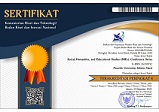Pendekatan Socio Emotional Learning (SEL) untuk Meningkatkan Keterampilan Sosial Siswa Kelas V SD dalam Pembelajaran PJOK
Abstract
This research is motivated by the lack of group cooperation, inability to convey opinions, reluctance to interact with peers, or tend to choose to be alone. This condition not only hinders the learning process but can also have an impact on the development of the child's character and personality as a whole. This is what encourages researchers to apply the SEL approach with the aim of improving students' social skills. The research method used Classroom Action Research (PTK). Data collection techniques from daily assessments were used as pre-cycle assessments, teacher and student activity observation sheets, and questionnaires. The subjects of this study were Class V elementary school students with a total of 36 people. The results showed that social skills reached 58.3% in cycle I to 83% in cycle II. So it can be concluded that the SEL approach can improve students' social skills.
Penelitian ini dilatarbelakangi kurangnya kerja sama kelompok, tidak mampu menyampaikan pendapat, enggan berinteraksi dengan teman sebaya, atau cenderung memilih menyendiri. Kondisi ini tidak hanya menghambat proses pembelajaran tetapi juga dapat berdampak pada perkembangan karakter dan kepribadian anak secara keseluruhan. Hal inilah yang mendorong peneliti untuk menerapkan pendekatan SEL dengan tujuan dapat meningkatkan keterampilan sosial siswa. Metode penelitian menggunakan Penelitian Tindakan Kelas (PTK). Teknik pengumpulan lembar observasi aktivitas guru dan siswa, serta angket. Subjek penelitian ini adalah siswa Kelas V SD dengan jumlah 36 orang. Hasil penelitian ini menunjukkan bahwa keterampilan sosial mencapai 58,3 %pada siklus I menjadi 83 % pada siklus II. Sehingga dapat disimpulkan pendekatan SEL dapat meningkatkan keterampilan sosial siswa.
Keywords
Full Text:
PDFReferences
Arikunto, S. (2016). Prosedur Penelitian Suatu Pendekatan Praktik. Jakarta: Rineka Cipta. Asdhar, H. J., & Yoenanto, N. H. (2024). Efektivitas Pembelajaran Berbasis Sosio-Emosional terhadap Pencapaian Belajar pada Siswa Sekolah Dasar: A Literature Review. Maharsi: Jurnal Pendidikan Sejarah dan Sosiologi, 6(3), 115-125. Bailey, R. (2006). Evaluating the contribution of physical education to learning. European Journal of Physical Education, 11(4), 395-408. Brackett, M. A., Rivers, S. E., & Salovey, P. (2011). Emotional intelligence: Implications for personal, social, academic, and workplace success. In T. D. S. Matthews (Ed.), Handbook of intelligence: Evolutionary, biological, and social perspectives (pp. 349-367). Cambridge University Press. Cambridge University Press. Brooks JR, D. K. (1984). A Life-Skills Taxonomy: Defining Elements Of Effective Functioning Indra Ramadhan, et al/ Journal of Sport Coaching and Physical Education 8 (1): 2023 Dowd, T., & Tierney, J. (2017). Teaching social skills to youth: A step-by-step guide to 182 basic to complex skills plus helpful teaching techniques (2nd Ed.). Boys Town Press. Dediknas. (2003). Kurikulum 2004 Standar Kompetensi Mata Pelajaran Pendidikan Jasmani Sekolah Dasar dan Madrasah Ibtidaiyah. Jakarta : Departemen Pendidikan Nasional Durlak, J., Weissberg, R., Dymicki, A., Taylor, R., & Schellinger, K. (2011). The impact of enhancing students' social and emotional learning: a meta-analysis of school-based universal interventions. Child Development, 405-432. Retrived from https://doi.org/10.1111/j.1467-8624.2010.01564.x Foulks, B., & Morrow, R. D. (1989). Academic Survival Skills for the Young Child at Risk for School Failure. Journal of Educational Research, 82(3), 158–165. https://doi.org/10.1080/00220671.1989.10885885 Greenberg, M. T., Domitrovich, C., & Bumbarger, B. (2003). The prevention of mental disorders in school-aged children: Current state of the field. Prevention & Treatment, 6(1), Article 1a. preventionandtreatment.org Goleman, Daniel. 2001. Emotional Intelligence Kecerdasan Emosional Mengapa EI Lebih Penting Daripada IQ. Jakarta: PT Gramedia Pustaka Utama. Gresham, F., & Elliot, S. (2008). Social Skill Improvement System Rating Scales. Journal of Psychoeducational Assesment, 29(3), 292-296. Gresham, F. M., Elliott, S. N., Vance, M. J., & Cook, C. R. (2011). Comparability of the Social Skills Rating System to the Social Skills Improvement System : Content and Psychometric Comparisons Across Elementary and Secondary Age Levels. 26(1), 27–44. McClelland, M. M., & Morrison, F. J. (2003). The emergence of learning-related social skills in preschool children. Early Childhood Research Quarterly, 18(2), 206–224. Retrived from https://doi.org/10.1037/a0022662 Hendrawan, B. (2016). Hubungan Antara Pengelolaan Kondisi Sosio Emosional dan Prestasi Belajar Siswa Pada Pembelajaran IPA Di Kelas V Sekolah Dasar: Hubungan Antara Pengelolaan Kondisi Sosio Emosional dan Prestasi Belajar Siswa Pada Pembelajaran IPA Di Kelas V Sekolah Dasar. Naturalistic: Jurnal Kajian dan Penelitian Pendidikan dan Pembelajaran, 1(1), 72-84. Huitt, G. W., & Dawson, C. (2011a). The integrated nature of learning. Educational Psychology Interactive. Valdosta, GA: Valdosta State University. Jones, S., Bailey, R., & Kahn, J. (2018). Preparing for effective SEL implementation. Harvard Garduate Shoole of Education Easel Lab. Available from Wallace Foundation. 1-11. https://www.wallacefoundation.org/knowledge-center/Documents/Peparing-for-Effective-SEL-Implementation.pdf McClelland M.M., Acock, A.C., & Morrison, F.J. (2006). The impact of kindergarten learning-related skills on academic trajectories at the end of elementary school. Early Childhood Research Quarterly, 21, 471-490.doi:10.1016/j.ecresq.2006.09.03 Mercier, R. (2013). Student-Centered Physical Education—Strategies for Teaching Social Skills. Journal of Physical Education, Recreation & Dance, 64(5), 60–65. https://doi.org/10.1080/07303084.1993.10609979 Muah, T. (2016). Penggunaan model pembelajaran Problem Based Instruction (PBI) untuk meningkatkan keaktifan dan hasil belajar matematika siswa kelas 9B semester gasal tahun pelajaran 2014/2015 SMP Negeri 2 Tuntang-Semarang. Scholaria: Jurnal Pendidikan Dan Kebudayaan, 6(1), 41-53. Sudarsinah. (2021). Pentingnya Pendidikan Jasmani Olahraga dan Kesehatan bagi Anak Usia Sekolah Dasar. Elementa: Jurnal PGSD STKIP PGRI Banjarmasin, 3(3), 1–10. https://doi.org/10.33654/pgsd.v3i3.1486 Sutisna, N., Suherman, A., Ma’mun, A., & Mulyana, M. (2019). Improving active learning time on physical education using movement education model. 3rd International Conference on Sport Science, Health, and Physical Education (ICSSHPE 2018), 296–298. https://doi.org/https://doi.org/10.2991/icsshpe-18.2019.84 Tinungki, G. M. (2015). The Role of Cooperative Learning Type Team Assisted Individualization to Improve the Students’ Mathematics Communication Ability in the Subject of Probability Theory. Journal of Education and Practice. Yoder, N. 2014. Teaching the Whole Child Instructional Practices That Support Social-Emotional Learning in Three Teacher Evaluation Frameworks. United State: AIR.
Refbacks
- There are currently no refbacks.





